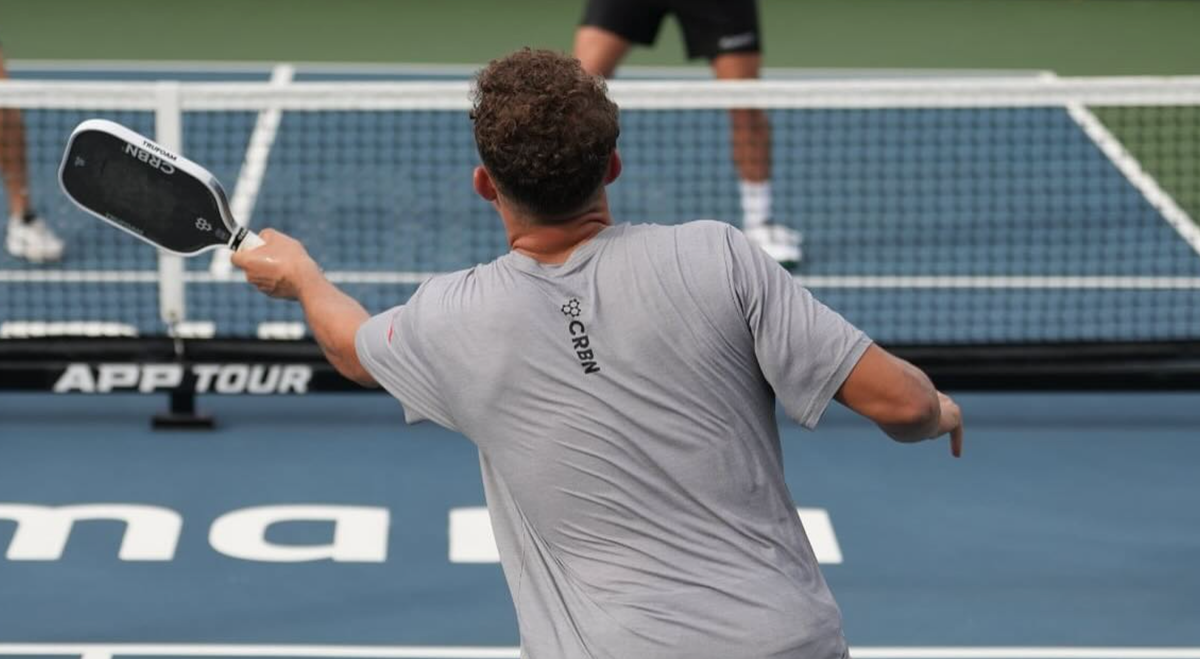Ask any fan of pickleball to describe the sport and at some point in their 20-minute speech, you'll hear the phrase "pickleball is addictive." Clearly, they're not alone since pickleball is annually dubbed the fastest-growing sport in the United States. And while most people say pickleball is addictive in passing, is there something more to it?
While pickleball is sometimes referred to as "addictive" by enthusiasts, within the psychological continuum model, those who play the most are motivated primarily by competition and skill progression. Fitness and socialization were also motivating factors among all respondents.
This is all a condensed interpretation of several research papers, that to some extent explain why players love to play so frequently. It's not addiction in the medical sense, but there are certain truths behind the urge to play pickleball more and more. In this article, we'll use data and research to break down the physical, social, and psychological motivations for why so many of us can't put the paddle down.

You Might Be Addicted to Pickleball If...
It sounds a bit like the start of misfired Jeff Foxworthy joke, but funny enough, the bar might seem pretty low when you see how this research study classified the most enthusiastic fans of pickleball - in other words, those who are most likely to nod their heads to the addictive nature of the sport.
What's Interesting About This Study?
Psychological Connection to Pickleball: Assessing Motives and Participation in Older Adults
In a true research paper fashion, the title could be no less than 11 words to be quality. Terrible jokes aside, this was a fascinating study conducted with a sample of nearly 700 pickleball players in North Carolina.
The research used the psychological continuum model (PCM) to group players based on their affinity to the sport. PCM uses four categories following a progression from lowest to highest relationship value between the player and pickleball, including awareness, attraction, attachment, and allegiance, which is the highest value relationship.
Players within this sample were classified into each group based on how long they've played pickleball and how frequently the continue to do so. Now this is where it starts to get interesting.
PCM categorizes based on behavior, assuming that someone who has played for a long time and does so at a continuously high frequency would have a higher loyalty to the sport than someone who is relatively new and only played once or twice.
With clear behavioral groupings established, the study then asked players to pick from a list of 5 motivations that best fit their own, these motivations included:
- Diversion
- Fitness
- Competition
- Socialization
- Skill Mastery
The Interesting Interpretation
As alluded to at the beginning of this article, the allegiant players with high loyalty to pickleball have been playing for more than a year and do so at least 10 times a month. Many of you reading this just questioned your pickleball addiction...
Nevertheless, the allegiant segment had different motivations compared to other categories - they play pickleball for the feelings of competition and mastering skills needed within the game. By contrast, other PCM groups were motivated by socialization and fitness.
One way to digest this information is to think of what drives the most "addicted" pickleball players to keep going - and if you break down "competition" and "skill mastery" into their most fundamental shapes, they're dependent on one another to fulfill.
Winning through performance requires developing skills, and developing skills requires competition as a method of testing. This creates a blurred line between the motivation to play and the reward for doing so. Does a player develop their skills to win games or do they win games as a byproduct for the reward of witnessing their progress within the sport?
It's getting a bit too metaphysical now - but the point to be made here is that players with the highest allegiance to pickleball are constantly in a cycle of motivations and rewards, where the moment one is filled the other is emptied.
With a research paper under your belt, let's look more closely at some of the more reader-friendly attributes that people find so appealing about pickleball. We'll cover physical, social, and psychological motivators.
Physical Factors That Make Pickleball Addictive
Highly Inclusive and Scalable
Pickleball is a low-impact, easy-to-learn, and play a sport that requires minimal coordination. This doesn't necessarily mean you can pick up a paddle and become a pro overnight - but it does mean that anyone of any age can enjoy pickleball as a recreational activity. This also means the sport can be as challenging or simple as you and your competitors can make it - this is the scalability factor that always keeps the sport challenging and interesting, but never unreasonably unattainable.
High Speed, Attention-Grabbing
Its smaller court size, lighter paddles, and quick ball speed allow for rapid rallies and more chances to hit the ball, making it chocked full of adrenaline moments. Games are short and points are high-intensity. To play, you have to focus, but that isn't challenging because of the pace. It's a stimulating experience where fitness is fun - you forget that you're getting exercise in the process.
Full-Body
Pickleball is a full-body workout, which releases a cocktail of dopamine directly linked to pleasure and reward. With the combination of upper-body movement from swinging the paddle and cardiovascular exercise from chasing down balls, your brain will be flooded with endorphins that make you feel energized, happy, and excited... all the good things.
Social Factors That Make Pickleball Addictive
Social Game
Pickleball's social aspect is enhanced by its inclusive nature. Players of all ages and skill levels can participate, making it a sport that brings people together. Pickleball also offers a fun and low-pressure environment, where players can interact and connect with each other while getting some exercise.
Teamwork
Doubles is easily the most popular way to play pickleball, which means teamwork is a must. Or something like that... Playing with a partner allows for communication and strategy, making it a great way to bond and connect with others.
Meet New People
Pickleball is rare in that in one moment a player could be reliving their competitive dreams and the next they could be cutting a joke. We're yet to find another sport that builds bridges with opponents in the way that pickleball does. Aside from the opposite side of the court, the influx of public courts has made it easier to meet new players than ever before. Striking up a conversation about shared interests means meeting people isn't anxiety-inducing.
Psychological Factors That Make Pickleball Addictive
Quick Improvement
Seeing progress so quickly contributes to the addictiveness of the sport because it caters to all skill levels. Whether you're a beginner or an advanced player, there's always something to learn and improve on. The moment you reach a specific goal, a new one begins. That combined with the inclusivity of the sport keeps players motivated to always improve and keep playing.
Community
Pickleball fosters a sense of belonging and camaraderie among players. It goes back to the inclusive nature of the sport, and you can find this just about anywhere. Whether playing in a local league or pickup game, players form bonds over shared experiences and the love of the game.
Reduces Stress and Anxiety
Reduced stress and anxiety are the outcomes of many factors on this list, but the standouts include physical activity and socialization. Which without coincidence, are the two factors that motivate the majority of players.
Physical activity releases endorphins to boost mood and healthily deal with stress. And playing pickleball with friends and feeling a sense of community builds the positive emotion of belonging.
It's Not An Addiction, It's An Allegiance
The reason why pickleball is so addictive isn't because of any one factor it's the combination of them all. The physical benefits, social aspects, and progress make pickleball an experience unlike any other. It's a sport that rewards effort, connects people through its inclusive nature, and keeps you coming back for more.
So, if you ever catch yourself thinking ‘Why can’t I just stop playing pickleball?’ you now know why. It's not an addiction, it’s an allegiance. Come join us! We'd love to have you...
Anuncie Aqui / Advertise Here
Sua marca para o mundo Pickleball! / Your brand for the Pickleball world!

 English
English  Spanish
Spanish  Portuguese
Portuguese  German
German  Italian
Italian  Japanese
Japanese  French
French  Polish
Polish  Russian
Russian  Netherlands
Netherlands  Hungarian
Hungarian  Turkish
Turkish  Videos
Videos 








 English (US) ·
English (US) ·  Portuguese (BR) ·
Portuguese (BR) ·